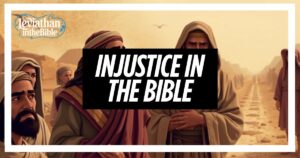Injustice in the Bible is a powerful theme that appears throughout many stories. There are countless examples of injustice in the Bible, like the oppression of the Israelites under Pharaoh and the abuse of power by corrupt kings. These stories show how people suffer because of unfair treatment and oppression. The Bible also teaches us what the prophets say about injustice and oppression.
Prophets like Injustice in the Bible and Micah call for justice, fairness, and protection for the poor and oppressed. What does the Bible say about injustice? Scripture on injustice reminds us that God is aware of all wrongs and will bring justice to the oppressed. Injustice in the Bible serves as a lesson for us to act with integrity and fairness. It warns us to avoid corruption and abuse of power, urging us to stand up for what is right.
1. THE OPPRESSION OF THE ISRAELITES IN EGYPT
The oppression of the Israelites in Egypt is a key example of injustice in the Bible. In Exodus 1:8-14, a new Pharaoh enslaves the Israelites, forcing them into hard labor and brutal conditions. This cruelty highlights the injustice they faced. Despite their suffering, God’s plan for their deliverance would ultimately unfold, bringing justice and freedom to His people.
Pharaoh’s decree to kill Hebrew boys is a tragic example of injustice in Bible. In Exodus 1:15-22, fearing Israel’s growing strength, Pharaoh orders the Hebrew midwives to kill newborn male children. The midwives, fearing God, disobeyed, saving the babies. This act of injustice against the innocent highlights the extreme cruelty the Israelites faced under Pharaoh’s rule.
The false trial of Naboth reveals the abuse of power in the Bible. In 1 Kings 21, King Ahab, influenced by his wife Jezebel, falsely accuses Naboth of blasphemy to seize his vineyard. Naboth is unjustly sentenced to death, highlighting how corrupt rulers exploit the weak for personal gain. This story calls for accountability and divine justice.
The murder of Naboth by King Ahab and Queen Jezebel is a clear example of injustice in Bible. Ahab desired Naboth’s vineyard, but Naboth refused to sell it. Jezebel orchestrated a false trial, leading to Naboth’s execution. This act of manipulation and corruption shows the dangers of unchecked power and the exploitation of the vulnerable.
The corruption of justice in Israel is a recurring theme in the Bible. In 1 Samuel 8:3, Samuel’s sons, who served as judges, were corrupt and took bribes, leading to injustice among the people. This failure of leadership caused God’s people to cry out for a king. It highlights the importance of integrity in leadership and justice.
The persecution of the prophets is another example of injustice in Bible. In 1 Kings 18:13, Queen Jezebel ruthlessly seeks to kill the prophets of God. These men, chosen to speak truth, are rejected and oppressed. Their persecution reflects the rejection of divine authority, showing how injustice often stems from those in power seeking to silence the truth.
The trial of Jesus represents one of the most infamous instances of injustice in Bible. In Matthew 26:59-67, religious leaders falsely accuse Jesus of blasphemy and seek his death. They manipulate the legal process and disregard the truth. This trial reveals the corruption of religious authorities and the miscarriage of justice that led to Jesus’ crucifixion.
The story of King David’s sin against Uriah is a sobering example of injustice. In 2 Samuel 11, David commits adultery with Bathsheba and arranges for her husband, Uriah, to be killed in battle to cover up his sin. David’s actions demonstrate how power can be abused to cover personal wrongs, and the consequences of such actions are severe.
2. King Ahab’s Seizure of Naboth’s Vineyard
Injustice in the Bible is clearly shown in the story of Naboth’s vineyard, found in 1 Kings 21. It’s a powerful example of greed, abuse of power, and the corruption of justice. King Ahab wanted Naboth’s land because it was close to his palace. He offered money or a better vineyard in return.
But Naboth said no. He respected God’s law and honored his family’s inheritance. Giving it away wasn’t just a deal,it was a matter of faith and tradition.
“O King, have you taken life and stolen legacy? The ground cries out where innocence fell, and in that very soil, your end shall be marked.”
Ahab didn’t take the refusal well. He sulked like a spoiled child,lying in bed, refusing to eat, and turning away from everyone. That’s when Queen Jezebel stepped in.
She used her power to commit evil:
- Wrote letters using Ahab’s name
- Ordered leaders to hold a feast
- Placed Naboth in a seat of honor
- Hired false witnesses
- Accused Naboth of blasphemy
- Had him stoned to death
- Cleared the way for Ahab to seize the land
This act wasn’t just murder,it was a clear case of judicial corruption. Jezebel’s actions show the danger of leaders who twist laws for selfish gain.
But God saw everything.
He sent Prophet Elijah to confront Ahab. Elijah declared God’s judgment, saying Ahab would face death in the same place where Naboth died. This was a case of divine justice.
“Far be it from me to trade the sacred gift of my ancestors,what was given by the Lord, I shall not give away.”
Even though human systems failed, God did not. The story reminds us that scripture on injustice speaks loudly,those who exploit others will answer to God.
3. THE RICH EXPLOITING THE POOR
Injustice in the Bible often appears in the form of economic oppression. Time and again, scripture warns against the rich using their power to crush the poor. This theme speaks clearly across both Old and New Testaments.
Prophet Amos boldly denounced those who abused the weak for personal gain. He exposed wealthy landowners who manipulated prices, exploited farmers, and forced grain from the hungry. Their greed drowned out justice.
James 5:1–6 delivers a severe warning to the rich who cheated workers and hoarded wealth. Their unpaid laborers’ cries rose to God Himself. Their corroded treasure became evidence of corruption.
“Wail, you who live in luxury, for the sorrow rushing toward you cannot be escaped! Your wealth is stained, and your fine clothing is torn and eaten by time. Your silver turns dark, your gold crumbles, and this decay will stand as a witness against you. It will rise like fire and consume your peace. You gathered riches while justice was trampled. The wages of those who bent in your fields, unpaid and silenced, now cry out in judgment. Their suffering has reached the heavens, and the Lord Almighty has heard. The hands you ignored, the hearts you crushed, they are not forgotten. You lived soft lives in hard times, but the day of reckoning is near.”
Isaiah 5:8 criticizes those who expanded their estates by swallowing up others’ homes. These elites robbed families of their land and left many homeless.
“Woe to those who seize land upon land, stacking wealth without end, until no space remains for the humble to stand, and the poor are pushed from their dwelling.”
Micah 2:1–2 reveals people plotting theft in the dark, seizing homes with no remorse. These were no random crimes,they were systemic, deliberate, and deeply unjust.
Throughout these examples of injustice in the Bible, one truth stands firm: God sees every act of exploitation. His covenant demands compassion. His prophets called out abuse. And His justice will not sleep
4. CORRUPT JUDGES ACCEPTING BRIBES
Injustice in the Bible warns against judges who accept bribes and twist justice. Such corruption goes against God’s demand for fairness and truth. It leads to suffering for the innocent and protection for the guilty.
One powerful example comes from 1 Samuel 8:1–3. Samuel’s sons, Joel and Abijah, were appointed as judges. But instead of following their father’s example, they chased after dishonest profits, accepted bribes, and distorted justice. Their actions made the people lose trust in judges and demand a king.
The prophet Isaiah strongly criticized the leaders of Jerusalem for turning away from justice. He described them as rebels who sided with criminals. These officials loved bribes and chased rewards. They ignored orphans and refused to defend widows. (Isaiah 1:23)
Likewise, Micah exposed how deeply corruption had spread among the leaders. Judges were accepting bribes, priests were teaching only for money, and prophets were offering messages in exchange for payment. Their actions were not led by God but by greed. (Micah 3:11)
The prophet Isaiah cried out against this corruption in Isaiah 1:23:
“Your leaders are rebels, friends of thieves. Everyone loves a bribe and runs after gifts. They don’t defend the orphans, and widows’ cases never reach them.”
This system harmed the most helpless in society. Here’s how:
| Group | How Corruption Hurt Them |
| Orphans | Denied protection in legal matters |
| Widows | Pushed aside in courtrooms |
| The Poor | Faced unfair treatment against the wealthy |
| Foreigner | Ignored or denied justice entirely |
didn’t stay silent either. He warned that those who take bribes and block the poor from justice at the city gates would face God’s anger. Their sins were many, and God’s judgment was sure. (Amos 5:12)
These examples show how bribery in leadership poisons justice. Instead of protecting the weak, corrupt judges served only those who could pay. But God’s judgment stands firm. He demands truth, fairness, and leaders who do not sell justice for gold.
5. THE TREATMENT OF URIAH BY KING DAVID
injustice in the Bible treatment of Uriah reveals a stark abuse of power. After committing adultery with Bathsheba, Uriah’s wife, David tried to cover his sin by bringing Uriah home from the battlefield. When that failed, David chose a darker path, orchestrating Uriah’s death to hide his wrongdoing.
David’s actions were a clear violation of justice. He not only betrayed Uriah’s trust but also used his position as king to manipulate the military for personal gain. By sending Uriah to the front lines, David ensured that his loyal soldier would be killed, all to conceal his sin and maintain his reputation.
King David’s actions toward Uriah stand out as a tragic example of power misused. After committing adultery with Bathsheba, Uriah’s wife, David tried to cover his sin. When that failed, he made a deadly plan.
David sent a message to his army commander with Uriah himself. The message instructed that Uriah be placed at the front lines of battle and then left exposed, ensuring his death. (2 Samuel 11:15)
This act was more than just betrayal,it was murder carried out under royal orders. David, once known as a man after God’s heart, used his position to:
- Break God’s law through adultery
- Cover his guilt with deception
- Sacrifice an innocent man to hide his shame
The prophet Nathan later confronted David using a powerful story. When David condemned the wrongdoing in that tale, Nathan boldly said, “You are that man.” (2 Samuel 12:7)
The prophet Nathan later confronted David about his actions, revealing the gravity of his sin. Through a powerful parable, Nathan exposed David’s wrongdoing. David’s response was one of horror, but Nathan boldly declared, “You are the man!” This marked the beginning of David’s painful confrontation with God’s justice.
6. FALSE WITNESSES AGAINST JESU
injustice in the Bible is a powerful example of injustice fueled by envy and fear. Religious leaders, feeling threatened by His influence, sought false witnesses to justify His death. Matthew 26:59–60 shows their intent clearly,they searched for lies, not truth. Yet, despite many attempts, no consistent testimony could be found.
Matthew 26:59–60 “exposes the injustice at the heart of Jesus’ trial: the religious leaders, including the chief priests and elders, were actively searching for people to lie against Him to justify a death sentence. Although many stepped forward with accusations, none of their testimonies held up or agreed.“
Religious leaders were determined to eliminate Jesus, not through truth but lies. They gathered many false witnesses, hoping someone’s story would stick. Yet none could present matching testimony, exposing the injustice of the entire trial.
In Matthew 26:59–60, “the depth of injustice is revealed. The chief priests and elders tried to build a case against Jesus by gathering false witnesses. Their goal was not truth, but a reason to execute Him. Many came forward with lies, yet none of their stories aligned or proved valid“.
Desperate to silence Him, the council allowed twisted words and manipulated quotes. False witnesses misrepresented Jesus’ teachings, especially about the temple, crafting accusations to portray Him as dangerous. Their testimonies contradicted, showing the trial’s corruption.
Matthew 26:59–60 “highlights the corruption behind Jesus’ trial. Religious leaders sought false witnesses, aiming to sentence Him to death. Despite their efforts, they couldn’t find consistent testimony. Even though several accusers stepped forward, their claims clashed, exposing the weakness and dishonesty of the entire process“.
Eventually, the high priest pressed Jesus directly. When He affirmed His divine identity, they called it blasphemy and condemned Him. No valid testimony was needed; they rejected the truth they feared.
The high priest violated legal procedures by interrogating Jesus directly. When Jesus affirmed His identity as the Son of God, they used His truth as the basis for a false charge. Their religious accusations soon shifted to political ones before Pilate,evidence of injustice driven by corruption and fear.
7. THE MISTREATMENT OF THE PROPHETS
injustice in the Bible those appointed by God to deliver His truth were frequently met with hostility rather than honor. The prophets,tasked with calling people back to righteousness,often faced brutal treatment, including imprisonment, violence, and death, for speaking boldly against sin.
Jeremiah, often called the prophet of sorrow, endured harsh persecution for faithfully proclaiming God’s message. He was beaten, shackled, and even thrown into a muddy pit. His own community in Anathoth conspired to silence him permanently, hoping to erase his voice and memory from among the people (Jeremiah 11:19; 20:2; 38:6).
“May the heavens deal with me ever so severely, if by this time tomorrow, your fate is not the same as those you struck down.”(Jeremiah 11:19)
The prophet Elijah, despite calling down fire from heaven, had to flee in fear after Queen Jezebel vowed to kill him. Her threat followed his victory over the prophets of Baal, showing that even miraculous signs did not protect God’s messengers from death threats (1 Kings 19:2).
“By the hand of the Almighty, if you are not brought low like the ones before you by this time tomorrow, let judgment fall upon me.”(1Kings 19:2)
Other prophets faced similar injustice:
| Prophet | Mistreatment | Scripture Reference |
| Zechariah | Stoned in the temple court | 2 Chronicles 24:20–21 |
| Isaiah | Traditionally sawn in two | Historical accounts |
| Amos | Banished by religious elite | Amos 7:12–13 |
| Micaiah | Beaten and imprisoned | 1 Kings 22:24–27 |
| Urijah | Executed after fleeing | Jeremiah 26:20–23 |
Jesus Himself lamented Jerusalem’s violent history toward prophets:
“Jerusalem, who kills the prophets and stones those sent to her…” (Matthew 23:37)
Stephen, before being stoned, echoed this pattern of rejection:
“Which of the prophets did your ancestors not persecute?” (Acts 7:52)
Rather than repentance, the people often responded to divine truth with violence. The lives of the prophets bear witness to one of humanity’s greatest injustices,rejecting the very voices sent to save them.
8. DISHONEST BUSINESS PRACTICES
injustice in the Bible condemns the use of fraud in commerce, highlighting that deceit in trade violates God’s moral code. God values fairness and truth in every transaction. Tampering with weights, measures, and pricing systems to gain advantage over others was, and still is, a serious offense in His sight.
Proverbs 16:11 makes it clear that God condemns such actions:
nequal weights are an abomination to the LORD, and dishonest scales are not good.”
One powerful warning appears in the book of Proverbs, where it’s made clear that cheating in trade is detestable to God, but honesty is something He loves. Traders in ancient times would commonly use one set of tools to buy and another to sell,ensuring they always profited at someone else’s expense.
Amos 8:4-6 highlights the greed of merchants who eagerly awaited the end of religious observances to resume their dishonest practices:
“Hear this, you who oppress the helpless, and make the poor suffer, saying: ‘When will the holy days be over, so we can go back to our trade? When will the sacred time pass, so we can cheat and sell? Lowering the measurement and inflating the prices, dishonestly adjusting the scales, so we can buy the poor for money, and the needy for a piece of cloth,selling even spoiled goods!”
Such traders:
- Shrunk volume in grain containers to reduce customer value
- Raised charges beyond fairness to boost personal gain
- Used tampered scales to tilt deals in their favor
- Offered poor-quality goods disguised as premium
- Took advantage of the poor, knowing they had no choice
Micah 6:10-11 reminds us that God knows when injustice and dishonesty are at play.
“Does the unjust have treasures of deceit in their homes, and false scales in their hands? Will I consider those pure who use dishonest measures and deceitful weights?”
Micah also delivered a sharp rebuke, declaring that God sees the dishonesty in every scale, container, and bag used for deceit. Those who filled their homes with wealth gained from injustice were not innocent in God’s eyes. The law warned: using false measures is not just wrong,it makes a person repulsive to the Lord.
9. THE WIDOW’S TREATMENT IN JESUS’ PARABLE
injustice in the Bible of the persistent widow in Luke 18:1-8, He presents a powerful example of injustice. The widow, who had no one to advocate for her, constantly pleaded for justice from a judge who had no concern for God or people. He initially refused but relented only due to her persistence, saying, “I will avenge her, lest by her continual coming she weary me” (Luke 18:5).
Though I have no fear of God or concern for people, I will grant justice to this woman. Her constant pleas are wearing me down, and I fear that if I don’t act, she will continue bothering me endlessly” (Luke 18:4-5).
This story highlights key truths about injustice:
- The marginalized often face obstacles in accessing justice.
- Those in power can neglect their moral duties for selfish reasons.
- Legal systems sometimes fail to protect those most in need.
In Jesus’ parable of the persistent widow, He illustrates the power of persistence in seeking justice. The widow, repeatedly pleading before an unjust judge, teaches us to never give up, trusting that God will hear our prayers and bring justice, even when circumstances seem hopeless (Luke 18:1-8).
Jesus’ parable reminds us to advocate for justice, especially for the vulnerable, and to challenge systems where those in power disregard the rights of others.
10. THE SELLING OF JOSEPH INTO SLAVERY
injustice in the Bible the Bible highlights a severe act of injustice committed by his brothers. In Genesis 37, out of jealousy and anger, Joseph’s brothers sold him into slavery to the Ishmaelites for twenty pieces of silver. This heart-wrenching decision stemmed from their deep resentment of Joseph’s dreams and their father’s favoritism.
The anger of the townspeople grew until they conspired to destroy the prophet. ‘Let us strike him down and throw him into the depths; and we will say, ‘A beast has torn him apart.’ We shall see how his words hold up in the end.'” (Genesis 37:20, NKJV)
- Joseph was the favorite son of Jacob.
- His brothers were envious of Joseph’s dreams.
- They plotted to kill him but sold him instead.
- Joseph was sold to the Ishmaelites for silver.
- This act set the stage for his later rise in Egypt.
Though Joseph’s brothers’ actions were cruel, God had a greater purpose. Joseph’s hardships in slavery led to his eventual rise as the second-in-command in Egypt, which allowed him to save his family during a famine. This story teaches how God can use even betrayal for His divine plan and good outcomes.
FAQ’s
Does the Bible promise justice for those wronged?
Yes, injustice in the Bible that God will bring justice. Though injustice may prevail temporarily, God ensures ultimate justice for the oppressed and condemns the wrongdoers.
How did the prophets address Injustice in the Bible?
Prophets like Isaiah and Micah spoke strongly against injustice in the Bible, especially in cases involving corruption, false testimony, and the abuse of power over the helpless.
What does the Bible teach about God’s response to Injustice?
The injustice in the Bible God will bring justice to the wronged. He promises to punish the unjust, as seen in the stories of Ahab and false witnesses against Jesus.
How does the Bible define fair judgment?
Injustice in the Bible condemns biased and unfair judgments. Fair judgment is treating everyone equally, without favoritism, especially for the poor, widows, and orphans.
What role do the leaders play in Injustice in the Bible?
Leaders in the Bible are called to uphold justice. Injustice arises when leaders misuse power, exploit the weak, or fail to defend the vulnerable and oppressed.
Conclusion
Injustice in the Bible is a recurring theme that highlights how God despises unfairness and oppression. Scripture often warns against corrupt leaders, dishonest practices, and exploitation of the vulnerable. Injustice in the Bible is not only a sin against people but also a direct violation of God’s commandments for justice and righteousness.One key example is the treatment of the poor and the needy, where God commands fair treatment and condemns exploitation.
The prophets frequently denounced corrupt rulers and unjust systems. Injustice in the Bible is also seen in false accusations, bribery, and the distortion of truth.Despite the prevalence of injustice, the injustice in the Bible God will bring ultimate justice. Those who perpetrate injustice will face God’s judgment, while the oppressed will be vindicated. This reflects God’s deep commitment to righteousness and fairness throughout history.

Obi Chukwu is the Admin of leviathaninthebible, a Nigerian blogging site. With 5 years of experience, he manages the site with care, ensuring smooth updates and helpful content for all readers.








